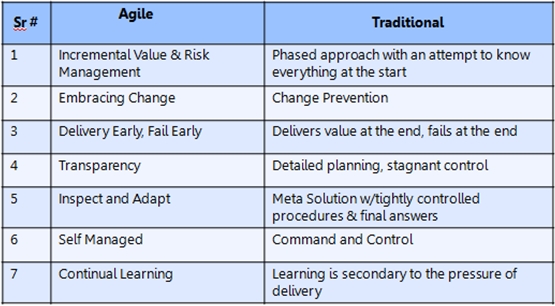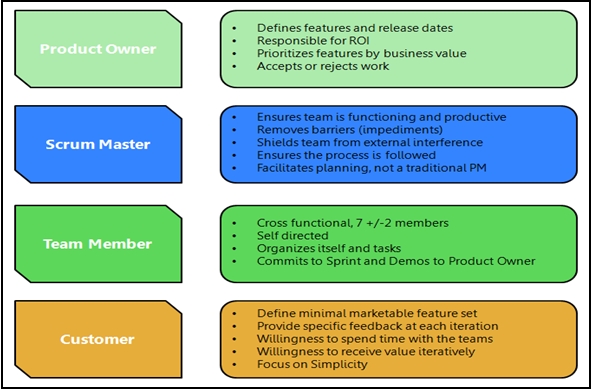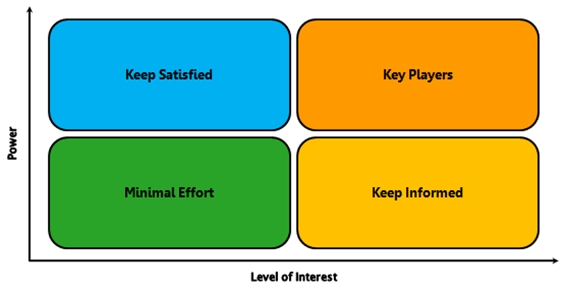Agile Methodology
Why on earth would this BOK be into existence when there are loads and loads of documentation available on company archives that we can refer to during crunch times. So, Am I reinventing the wheel? No way. The below bulleted matrix would help you keep afloat in case you hit the agile monster or have butterflies in your stomach about Agile based projects and its future. So, is Agile Immortal? Humm ……….let me think. Well Almost for the current era. Agile is a way for product companies to substance their lively hood by ensuring they power pack their software products by business driven factors which we know as requirements, enhancements, UI features, and bug fixes. Agile is a way to build software using the small optimized revisions that resembles the iterative and incremental approach. This resembles as a scaled down approach of the predecessors. The key element to Agile is it ensures that the risks elements are at bay. The earlier methodologies have galvanized into the Agile and Agile would be a reflection of its predecessor’s best practices.
Kracking the Agile Monster Sprint=Requirement/s
One sprint would contain analysis, design, development, testing, and deployment. This sprint would form one delivery e.g. 1.0.1. The next sprint would be delivery 1.0.2 so on and so forth. There would be multiple such sprints across the project/product timelines scale. Meaning there would be multiple such sprints spanning the entire product life cycle from Inception phase till end of the product life span. The following diagram depicts Agile at the core.

Figure 1: Agile Process Architecture
Agile Vs Traditional
The below table compares the Agile Vs Traditional approach

Agile Roles
The following diagram depicts the overall governance structure for Agile projects

Stakeholders Management
Stakeholder Management is an important discipline that successful architects can use to win support from others. It helps them ensure that their projects succeed where others fail. The technique should be used during initial in the engagement to iron out the unknowns and streamline the operations management part of the engagement.

Risk Level Classifications
Impact classification Vs Risk Level for the Unknowns listed in the following sections
| Risk Level | Impact Classification |
| High Risk | Major Timelines Slippages, cost and effort overrun anticipated if not taken care |
| Medium Risk | Minor Timelines Slippages, cost and effort overrun anticipated if not taken care |
| Low Risk | Negligible Timelines Slippages, cost and effort over anticipated if not taken care |
Stakeholders
| Acronym | Description |
| Prog Man/EM | Program Manager/Engagement Manager |
| BDM/AM | Business Development Manager/ Account Manager |
| DM | Delivery Manager |
| PM | Project Manager |
| Team | Consultants and Co |
| Customer | Customer |
| SME | Subject Matter Expert/Domain Expert |
| BA | Business Analyst |
| 3rd Party | Vendors/Partners |
High Risk Elements
| Unknowns | Possibilities | Stakes Holder Matrix | |||
| Minimal Effort | Keep Informed | Keep Satisfied | Key Players | ||
| Would it only involve minor/major enhancement or agile based requirements? | Agile, Xterme, Crums | Rest | Prog Man | Customer | Team |
| Has the Customer Program Manager familiar/worked using the Onsite offshore model/GDM methodology? | GDM Methodology Appraisal (SLA, OLA etc) | Rest | EM | Prog Man | Customer |
| Is the network connectivity between DC and Customer facility already established? | Work with Internal and external IMG for connectivity. Before the delivery date of first sprint. | Rest | EM | Customer/ Prog Man |
IMG External/ Internal |
| Are there other vendors currently looking into these pieces currently ? What is the team size interms of FTEs ? | This would give us a gusstimate on the kinda of resourcing effort | Rest | Account Manager | EM | Prog Man/DM |
| What are the target operating systems for the product lines? Will it be only limited to the server OS ? | Win 95, 98, 2K, 2K3, SKUs, server, home | Rest | Prog Man | Customer/ Team |
|
| In terms of compatibility would the new s/w need to be compliant with different set of H/W platforms ? | Pentium, Blade, Idanium | Rest | Prog Man | Customer/ Team |
|
| Has the effort already been estimated and what has been committed to the client ? | Estimated needs to validated from via Use Case/FP/Internal Methodology, | AM | Prog Man/EM | Customer | Architect |
| If its multi OS kinda environment we need to accommodate these into the estimates as well and the effort will shoot up considerably. | Use Case, WBS or FP | AM | Prog Man/EM | Customer | Architect |
| Does the ground work need involvement and support of non-delivery personnel | SME, Domain Expert or Vendors ? | Rest | SME/3rd Party | EM/Customer | Prog Man |
Medium Risk Elements
| Unknowns | Possibilities | Stakes Holder Matrix | |||
| Minimal Effort | Keep Informed | Keep Satisfied | Key Players | ||
| The component may have a dependency on other components and should be ready before we start the development of the said components. | Would Impact IT/ST/UAT phase, Server/Middleware components | Rest | EM, 3rd Party | Customer | Team/Prog Man |
| Is the staging environment already in place for testing? If not what is the timelines that the customer is looking for the staging environment to be fully operational for UT/IT/UAT testing of all use cases ? | Impact the delivery timelines. You got to flag this to the Stakeholders in advance and should be on the back burner till resolved. | Rest | Team | EM | Prog Man/ Customer |
| What kinda of testing will be required to be done by Infosys teams ? | Unit/Integration/ Systems/UAT |
AM | EM | Prog Man | Customer/ Team |
| Are there any propriety tools planned to be used for S/W development activity ? viz CM, tracking, instrumentation | Clearcase, Bugzilla, FxCop, Visual Studio, Plans for training | Rest | EM | Customer/ Team |
Prog Man/DM |
| Are there any propriety frameworks/solutions planned to be used for S/W development activity ? | Plans for training | Rest | EM | Customer/ Team | Prog Man/DM |
| A specific H/W requirement if this has to be executed from Offshore ? | Blade Servers | Rest | EM | Customer | Prog Man/DM |
| Are the technologies finalized for implementation phase ? | C#/C++/VC++/ASP.Net/Web Services, BizTalk, Code Generators, Frameworks | Rest | Prog Man/AM | Customer/ Architect |
|
Low Risk Elements
| Unknowns | Possibilities | Stakes Holder Matrix | |||
| Minimal Effort | Keep Informed | Keep Satisfied | Key Players | ||
| Are there any specific performance requirements for this software ? In terms of timing considerations? | Page load times, User loads, DB transaction/sec | Rest | Team | Prog Man/EM | Customer/ Architect |
| Is there any specific requirement on the size of the deliverable? | Less than 10KB | Rest | Team | Prog Man/EM | Customer/ Architect |
| Are there any particular non-functional requirements for the components ? | Scalability, security, modularity, extensibility, Performance | Rest | Team | Prog Man/EM | Customer/ Architect |
| Is the work limited to said component/s or it will also involve working on the dependencies and server pieces? | Rest | Team | Customer | Prog Man | |
| Is there a planned ramp up time before the start of actual work ? | KT etc, at time you may be expected to hit the ground running | Rest | Team | Customer | Prog Man |
| What are the set of deliverables planned for the target activities? | Specs, Code, Instrumentation Reports, UAT, Impact Analysis docs, high level design specs | Rest | Team, Prog Man/EM | Customer | Architect/ PM |
| What will be the customer technology team’s role during different SDLC phases of the project ? | Governance, Reviews, Direction Setting | Rest | Prog Man | Customer | |
| Do we need to interact with the Customer Business/Marketing/Sales teams directly ? | This needs to be sorted out before the start of the engagement as this would hog lots of Bandwidth in crunch times | Rest | Prog Man | Customer | |
| From which stage would the customer want vendor’s involvement? | RA, Design, Construction Phase ? | Rest | Prog Man | Customer | |
| Do we have a time to market for these pieces ? Do we have a product road map for these pieces/components ? | Product Roadmap | Rest | Team | Prog Man | Customer |
| What’s kind of Customer oriented process/methodologies do we need to follow as guidelines ? | Coding Standards, Check in/check out procedures branching requirements, | Rest | Team | Prog Man | Customer |
Passing Thoughts
So how would this so called check list benefit me and my track. Generally, for the Agile Programs everything is agile in nature. The program manager, queries, the person sitting in the adjacent cubical, the dudes serving chicken curry in the B12 canteen. But a certain thing is every time there is new project requirement/s that comes to me I have a set of generic questions that would nag me till the final deliverable is handed over to the customer. This list contains few of those questions/queries/pain points. They are all legitimate in nature the key is when you may wanna apply them in real life problems or scenarios. There are specialized version of Agile that would be applicable to custom, package, legacy, web services but the core is what I have tried explaining in my artifact.
I believe the Agile, RUP and MSF are the big-boys of the Software Methodologies and we will get to hear of them more often that not in the coming quarters. RUP and MSF are specialization of Agile to a certain extent and at time things would hover above reality and beneath illusion and in which case I generalize all the lingos to the big dady – Agile Methodology. You may wanna check this check list even if your program manager is not bulling about Agile. Think about it.
References
http://www.agilealliance.com/home
http://www.extremeprogramming.org/

















